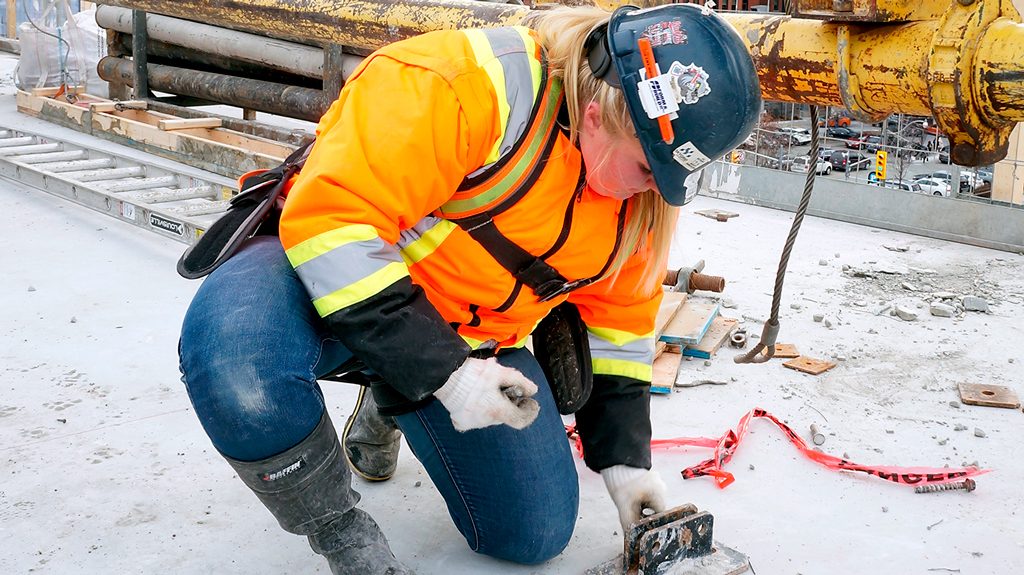The statistics are a stark reminder that the construction industry still has a long way to go. While there are more women working in construction, change has been slow.
Over the past 15 years, the construction workforce has grown by over 90 per cent, yet women’s participation has grown on average by roughly one per cent. While women make up more than half of fields like educational services, accounting and investment, they represent only about four per cent of Canada’s skilled construction workforce. Making up that lost ground isn’t easy, but it is possible if the construction industry stays focused on showing more young women and their parents why the skilled trades are a great career choice.
The construction industry, government, and organizations are increasing their efforts to promote, support and mentor women in the skilled construction trades. Each year there are more workshops, seminars and career fairs across the country aimed at making young women aware of all the benefits of a career in construction.
At a recent Skills Canada B.C. event, a panel of women in their early 20s shared their experiences working in the skilled trades, including their sense of pride, the freedom, flexibility and good pay that comes with the job. One 23-year-old explained she was about to buy her first home in Vancouver. The entire time, not one student in that Grade 9 audience pulled out her cell phone. They were engaged and inspired. If only their parents had been there.
Imagine: no school debt. Home ownership. What parent wouldn’t want that for their kids? Yet, all too often, students return home from these events to parents who don’t share their enthusiasm for the skilled trades. Many teachers and high school career councillors don’t see the skilled trades as a first career choice either. To this day, that’s one of the biggest barriers. It’s simply not enough to raise awareness among young people.
A seismic shift in attitudes is needed before careers in the skilled construction trades are seen for what they are — leading edge, in demand, requiring a combination of hard and soft skills. And young women don’t have to swing hammers or pour concrete to work in construction. The industry really needs people with backgrounds in project management, architecture and technology as well.
Over the years, barriers have been coming down. One of the key challenges for women in our industry, especially young women starting their families, has always been striking that work-life balance.
The passage of MP Mark Gerretsen’s private member’s bill in the House of Commons last June is a welcome sign of the changing times. Bill C-243, the National Maternity Assistance Program Strategy Act allows women who work at dangerous jobs to collect paid maternity leave early. The inspiration was a Kingston, Ont. mother and welder whose doctor recommended that she stop work early, leaving her without pay for 32 weeks.
“No woman in Canada should have to choose between being a mother and pursuing her dream job,” Gerretsen said. “I believe that we need to level the playing field, so that women have an equal opportunity to participate in all sectors of the labour force.”
This decade, up to a quarter of Canada’s construction workforce or about 250,000 workers are retiring. Over the same time frame, up to 40 per cent of jobs created in Canada will be in the skilled trades, according to Skills Canada. With the skilled trades playing such a prominent role in the future economy, the timing is ideal for women to pursue construction careers.
However, industry has to do its part by thinking differently about how it keeps women engaged.
For example, BuildForce Canada’s recruitment tracking show that while more women are expected to enter the construction trades during B.C.’s peak construction cycles, without further incentives many are likely to leave the industry when projects wind down.
For companies fortunate enough to hire women, the focus now should be on convincing them to stay. Women who feel truly welcome, are mentored and have every opportunity to advance and succeed, are far more likely to make construction their first and long-term career choice.
Keri Salvisburg Miller is Vice-President, Member Services at the Progressive Contractors Association of Canada. To comment on this column email editor@journalofcommerce.com.











I am a 27 year old women who is a Redseal journeyman electrician. I was working at a regional hospital build and got pregnant I worked as long as I could but had to take an early leave so that leaves me with time unpaid which isn’t ideal but I’m making it work. It would be great if they could some how accommodate all women who work in higher risk jobs while they go on maternity if it needed to be early.